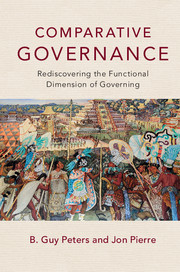Comparative Governance
Decision-making is at the heart of governing and governance, and is a more challenging task compared to just a few decades ago as a result of increasing social complexity and globalization. In this book, B. Guy Peters and Jon Pierre propose a new framework for the comparative analysis of governance, arguing that government remains a central actor in governance. By articulating the functionalist dimension of governance they show how goal setting, resource mobilization, decision-making, implementation and feedback can be performed by a combination of different types of actors. Even so, effective governance requires a leading role for government. The framework is also applied to a taxonomy of governance arrangements and national styles of governing. Comparative Governance advances our knowledge about governance failure and how forms of governance may change. It also significantly strengthens the theory of governance, showing how governance can be studied conceptually as well as empirically.
- Outlines and specifies a functionalist framework of governance that will help scholars of governance to design empirical research
- Develops a taxonomy of governance models with different degrees of state centrality which will serve as an important frame of reference in governance studies and comparative politics
- Applies the functionalist framework in analyses of public administration and intergovernmental relationships to offer a new theoretical approach
Reviews & endorsements
'The book provides a framework for better understanding of the theories of governance and is a major contribution in that direction. … Recommended. Upper-division undergraduates through faculty.' A. R. Abootalebi, Choice
Product details
October 2016Hardback
9781107163799
270 pages
235 × 157 × 18 mm
0.49kg
2 tables
Available
Table of Contents
- Preface
- 1. The governance problem
- 2. The theory of governance
- 3. Decision-making: the essence of governing
- 4. Governance and comparative politics
- 5. The institutional politics of intergovernmental relationships
- 6. Implementation, administration and governance
- 7. Governance failure, functional failure and state failure
- 8. The change of governance and the governance of change
- 9. Conclusions: governance, functionalism and comparative politics
- References
- Index.







